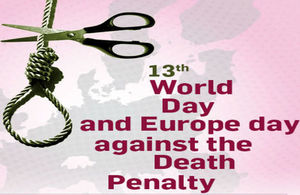The UK and EU Mark International Day Against the Death Penalty
Ambassadors from the various European Union Missions in Tanzania joined the Head of the EU Delegation to mark International Day Against the Death Penalty.

13th World Day against the Death Penalty
The Ambassadors met senior officials from the Ministry of Justice and Constitutional Affairs; the CHRAGG (Commission of Human Rights and Good Governance); and visited Ukonga Prison where they met senior staff and prisoners, including some on death row.
The European Union holds a strong and principled position against the death penalty.Based on consensus among all EU member states, the EU promotes the abolition of the death penalty, if necessary with the establishment of a moratorium as a first step. Where the death penalty still exists, the EU calls for its use to be progressively restricted and insists that it be carried out according to international minimum standards.
The EU considers capital punishment to be cruel and inhuman and believes the death penalty fails to provide deterrence to criminal behaviour and represents an unacceptable denial of human dignity and integrity. We also believe that a miscarriage of justice – which can be inevitable in any legal system – is irreversible.
The abolition of the death penalty worldwide represents one of the main objectives of the EU’s human rights policy.
The European Instrument for Democracy and Human Rights (EIDHR) currently supports projects around the globe: in Asia (e.g. China, India, Taiwan), the Americas (Caribbean Countries, USA), Africa (e.g. Mali, Uganda, Liberia), Eastern Europe (Belarus and Russia) and the MENA Region (Jordan, Morocco and Tunisia) – around reforming criminal codes, respecting the relevant international and regional instruments, and advancing a conductive environment for abolition.
The EU is the leading institutional actor and lead donor to civil society organizations around the world promoting the abolition of the death penalty.
Death Penalty Project
The ambassadors also heard from Joseph Middleton form the British charity The Death Penalty Project who have been working against the death penalty since 1992. They are funded by a number of funders including the UK’s Foreign and Commonwealth Office, the Swiss Federal Department for Foreign Affairs, the UN Voluntary Fund for Victims of Torture and other charitable foundations. The work of The Death Penalty Project originally began in 1992 concentrating on appeals in individual capital cases from the Caribbean and applications to international human rights tribunals. DPP have assisted on more than 200 cases worldwide. As well as representing individuals these cases have been strategic litigation which have led to a series of landmark decisions in criminal and constitutional cases to restrict the use of the death penalty.
In the past decade their work with local lawyers and NGOs in a number of African countries in criminal has had considerable success; the mandatory death penalty has been declared unconstitutional in Uganda, Malawi and in Kenya more than 4000 death sentences were commuted to life imprisonment.
The organisation aims to achieve its objectives in four main ways:
-
Free legal representation and advice. For individual prisoners under sentence of death in Caribbean countries who have exhausted all other domestic appeals they provide pro bono representation in applications to the Judicial Committee of the Privy Council in London, which is still the final Court of Appeal for all English-speaking Caribbean countries, save for Barbados, Belize and Guyana. For prisoners in other jurisdictions, or for jurisdictions that do not retain the Judicial Committee of the Privy Council as their final Court of Appeal, they provide legal advice in criminal appeals and constitutional challenges to the death penalty.
-
Strategic litigation. Cases are brought before regional and international human rights tribunals seeking appropriate remedies where there are violations of international human rights law. This serves to promote minimum fair trial guarantees, and to develop human rights standards restricting the imposition and implementation of the death penalty.
-
Consultation and training. The DPP advise and enter into discussion with governments, members of the legal profession and NGOs in any jurisdiction on questions of domestic and international human rights law concerning the imposition and application of the death penalty.
-
Research. Their ground-breaking legal work is consolidated through research studies, publications, training and education, particularly for those members of the legal profession involved in the defence and prosecution of capital cases as well as members of the medical profession involved in assessments in capital cases. They also coordinate Judicial Colloquiums and themed workshops for members of the Judiciary.
In Tanzania the DPP have been working with the Legal and Human Rights Centre (LHRC) and the Tanganyika Law Society (TLS) since 2007 in bringing a constitutional challenge to the mandatory death penalty. The DPP’s work in Tanzania has been funded by the Human Rights and Democracy Department in the UK’s Foreign and Commonwealth Office, along with other work in East Africa (Kenya, Uganda, Malawi).